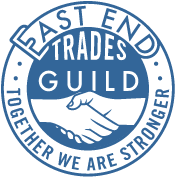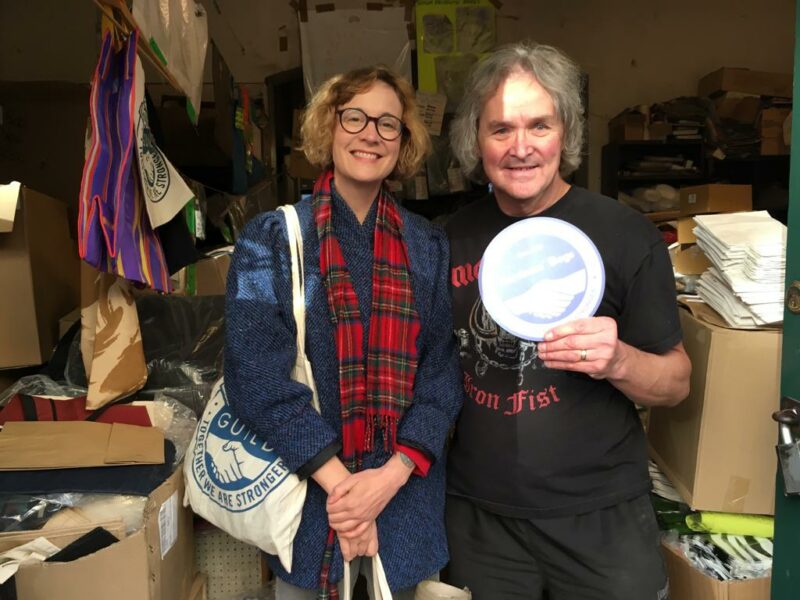Taking Hackney Arches into Community Ownership!
Blog by Guild Director Krissie Nicolson.
PLEASE DONATE TO OUR CROWDFUNDER HERE. THANK YOU!
I first started my journey with the Guild walking into Gardner’s’ Bags after reading about Paul Gardner in Spitialfields Life in 2010. Paul is a fourth-generation Market Sundriesman and as the oldest family business in Spitalfields, Gardners became the first member of the EETG. I was on a Master’s programme with Citizens UK at Queen Mary University learning about the craft of Community Organising, which has its roots in the Trades Union and Civil Rights movement.
In all the years since I have been testing the theory of Organising working with a different type of institution from the traditional norm of Universities, Schools, Mosques, Synagogues, Churches and Trades Union Branches.
Back in 2010, I pondered; did it muddy the water to be organising profit-making organisations? What I came to learn is that both size and place really matter. Professor of Evolutionary Psychology Robin Dunbar, has a figure for the number of social relations one person can interact with in a meaningful way and that number is 150.
Most of the East End Trades Guild members are micro-businesses with fewer than 10 employees. This means they know each other well; they wouldn’t want to let each other down due to the strong bonds that develop through spending time with each other for 5 days a week. Many of them are also family businesses, some of them have been run by the same family in the same place for generations. Members are known to and know the neighbourhood.
When we really know someone, what they care about, what motivates them, their roots, and their dreams we are much more likely to develop empathy, solidarity, reciprocity and trust. I would argue that when small businesses become larger than 150 employees these innate values that are built through relational bonds are lost. If you work with hundreds of people in a big company, the staff simply don’t know each other that well and so don’t care as much about their colleagues or what they think or feel. And if they commute into plush offices, they probably don’t care that much about the place where their office is located.
Despite these strong bonds, small businesses and social enterprises are vulnerable to the exploitation of market forces because big business has all the voice, resources and influence they can buy. We all know it, it’s plain to see how cities have been changing everywhere for the last 40 years because of economic policy that favours growth at any cost. The New Economics Foundation wrote a paper on it called Clone Town Britain back in 2007.
In 2016 myself and a team of members had the chutzpah to create a constructive relationship with the Mayor of London who has the power to act on members’ issues. We attended the Peoples Question time to invite Sadiq Khan to have breakfast at the legendary Cafe and founding members E. Pellicci on Small Business Saturday. Sadiq Khan agreed to attend and was good to his word. He drank tea with our members amidst a packed little cafe and listened to their concerns about high rents. Back then we had enough people power for him to listen to us, but we weren’t yet powerful enough to compel action.
I remember Anna Pellicci giving the most articulate speech to Sadiq Khan that I have ever heard in relation to why we need action on affordable rent she said.
“Not just us, all the little businesses, we’re such an integral and important part of the community. All the city stuff is great, it’s moving forward but if it moves too much London will lose its heart and soul. All these businesses, it’s a little bit of everyone and anyone, it’s what makes East London what it is. I mean look at this table where are we all from? It’s a proper mashup! But we’re all one, we’re different but we’re all one at the same time. Together we are Stronger.”
Pellicci’s Cafe will never be under threat because the family owns the building. This highlights why we need more permanent spaces for communities to gather, eat, play, shop and just be together.
In comparison to E. Pellicci the corridors and offices of City Hall must seem stale. Ivory towers are often where policies are dreamed up and done to instead of together with communities. Hence we get siloed ideas such as Creative Land Trusts for one type of industry. But as with the rules of nature diversity is key for an ecosystem to thrive.
Last time there was a Mayoral Election in 2021 we tested our people power with the Mayor of London again. This time taking solid proposals to all the main candidates for Mayor, meeting the Labour candidate at Spitalfields Farm. Safely socially distanced and amidst the goats bleating Sadiq agreed to support our Community Land Trust idea. Now with your help, we can have enough resources and constituent power to hold him to account.
We’ve been doggedly building and sustaining our membership for the last 13 years for this precise moment in time. A small window of immense opportunity, if we don’t seize it now to create the Trades Guild Community Land Trust it will be gone for good.
Together everyone who Signed Len Maloney’s letter to Sadiq Khan stopped JC Motors from being evicted, together we can take Len’s arch into community ownership to be safe forever! And more than this we can change the rules at a local level by creating a broad-based, inclusive, and truly democratic Trades Guild CLT that can create more community-owned spaces across the city. Three arches are just the start!
Whether you donate £1 or £1000. All contributors will be invited to become founding members of the new Trades Guild Community Land Trust.

